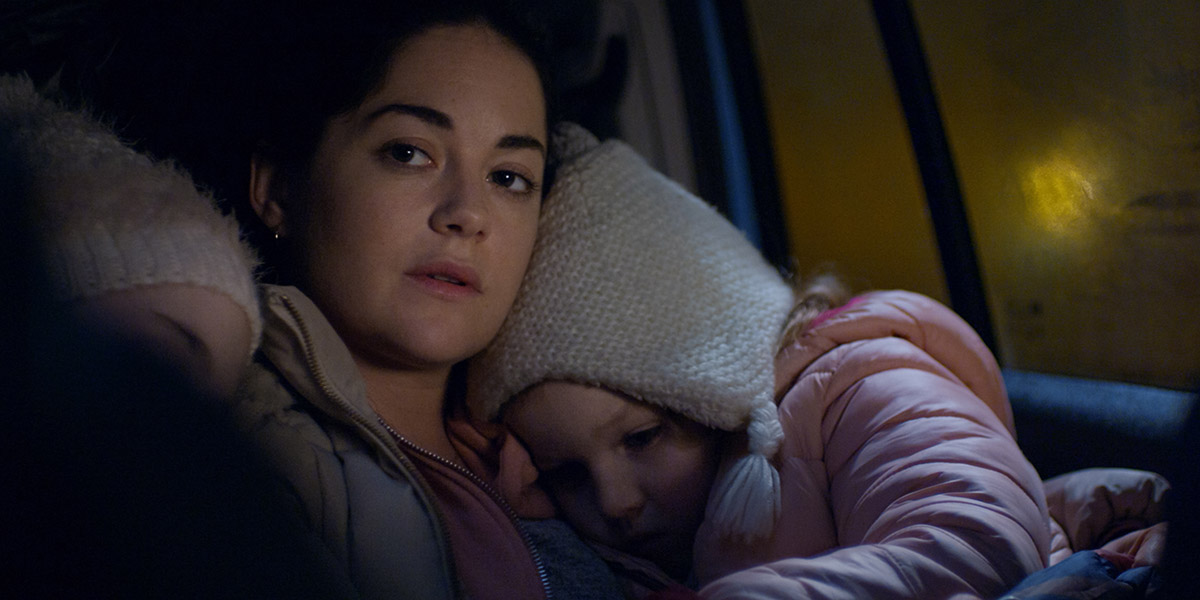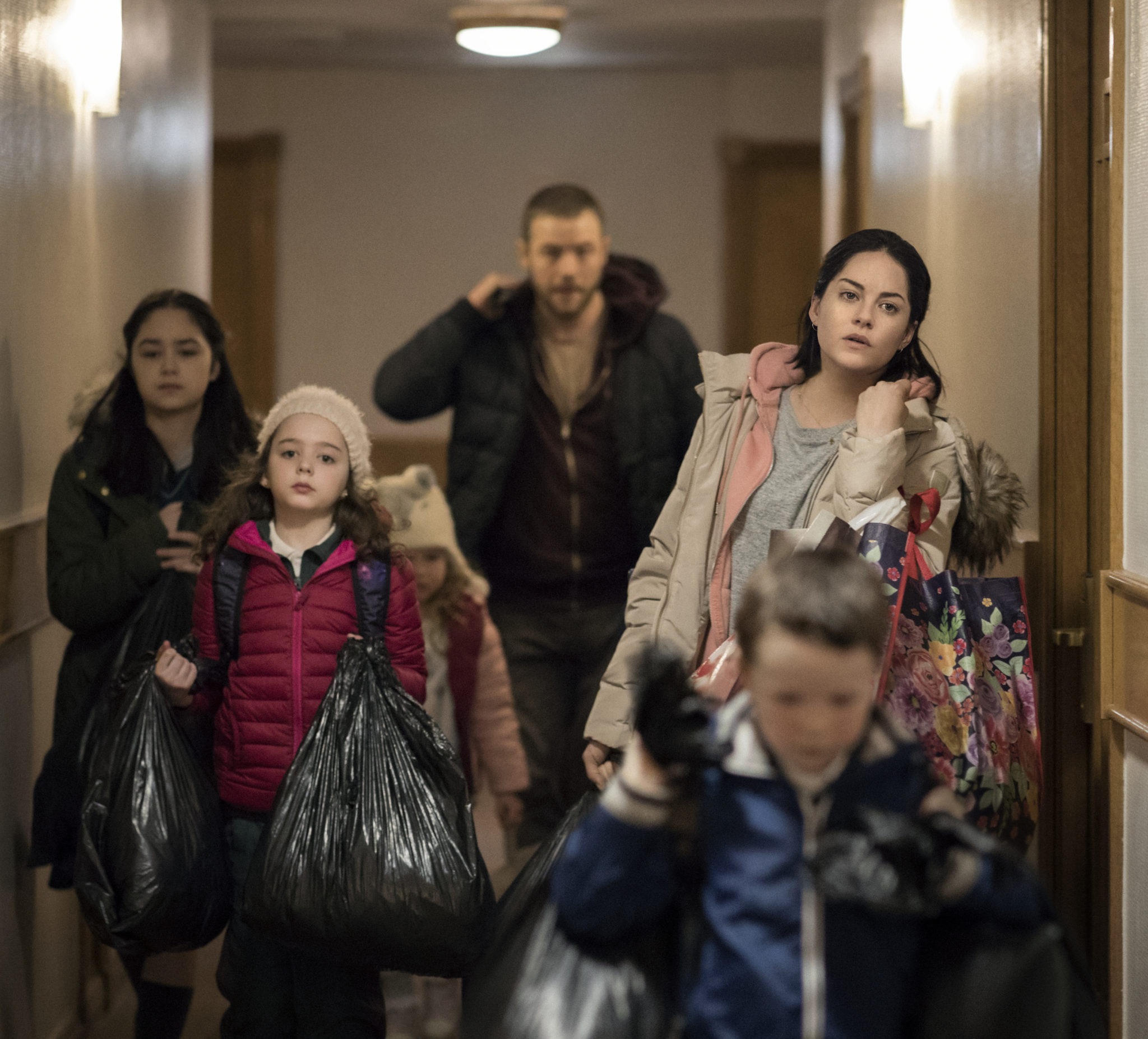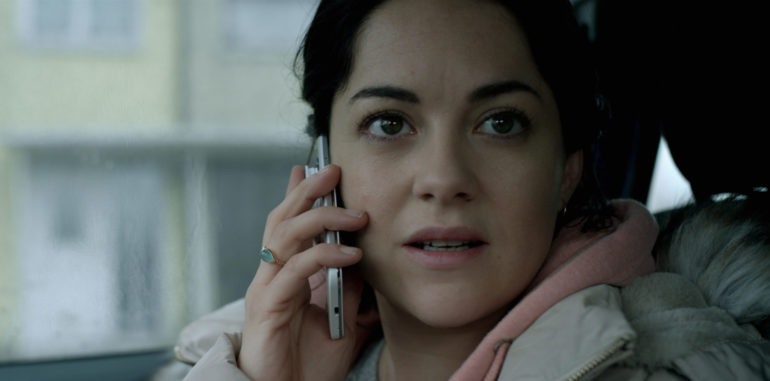We arrive at midday on a crisp March day to a nondescript West Dublin hotel, where Scannain has been invited on set to see Paddy Breathnach and crew film some key scenes for his latest drama on the homelessness crisis, Rosie.
We are ushered into a remote corner of the hotel where Breathanch, DoP Cathal Watters and their camera crew are lighting an elevator lobby for a scene that involves the entire Davis-Brady family, led by Sarah Greene’s Rosie and Moe Dunford’s John Paul, exiting and moving down the hall. Multiple camera positions and lighting decisions are enacted as Breathnach resets and films over and over until they have the perfect scene. Then the cast and crew pack up and decamp to the floor below to set up for another key scene in this unfolding drama.
As cast, crew, and us bystanders are moving around the hotel from location to location it becomes increasingly obvious that this is still very much a working hotel ,and that the film is a temporary interloper. Porters and cleaners bustle about their business as equipment and technicians try to take up as little room as possible in the long corridors. We now find ourselves outside the door of the room in which the family has spent the first frantic night in the film, a room with three beds where 2 parents and four children get to spend one night with all of the worldly possessions that will fit inside their car.

© Element Pictures Distribution
Rosie, the film, is the story of 36 hours in the life of a Dublin family who find themselves without a permanent residence. As the titular Rosie says “Not homeless. We never use that word”. Their home is in the process of being sold by their landlord, and despite John Paul’s full-time position in the kitchen of a higher-end restaurant, they find themselves victims of circumstance, unable to afford to buy the house in which they’ve lived for many years and unable further to find a place to rent in the increasingly narrowing rental property market in Ireland’s capital. This forces them to pack their dog and most of their belongings for storage in a family member’s small apartment and fit their necessaries into their MPV that has become their ark. All the while life goes on, kids need to be brought to school, John Paul needs to work, and Rosie needs to find a place for one night or more as she tries to hold her family together against increasingly difficult odds. Small everyday occurrences become huge dilemmas. Things as simple as their youngest daughter needed to pee becomes a drama as they only have the car.
Back in the hotel Breathnach and crew are back in business as they prepare to film a scene involving the family leaving the hotel room. It’s a big organisational task as all of their belongings must be ferried in one quick movement out to the car so that John Paul is not late for work and the kids can get to school on time. The bedroom door opens and the family trundle out with purpose and set off down the hall. “Cut, lets go again” comes the call from the director, forcing an about turn from Greene and Dunford and the child actors, who range in age from preschooler to teenager. All are dressed for the cooler atmosphere outside, but here in the corridor it’s warm and stuffy. Nevertheless no complaints are heard from any of the cast as they film the scene several more times. On one action the youngest cast member, Molly McCann, who plays Madison, has a fall, prompting an immediate response from her parents, who are watching attentively from the sides. Bump over, she is quick to return to fray and the scene starts over again.
The narrow corridors, the limited locations, and the quick pace of the pre-production and principal photography on the film (both four weeks) add to the anxious and frantic nature of the main characters predicament. Breathnach credits this ability to move quickly to the power of the great script from Roddy Doyle, so we took this chance to catch up with Doyle to talk about what inspired him to write it.

© Element Pictures Distribution
What led you to write a story about the homelessness crisis?
I suppose it is an outrageous fact that so many people are homeless. And the attempts to make it seem normal, like that spin a few months ago that we do quite well in terms of other European countries, and then only actually presenting the extreme cases of homelessness. I was listening to the news in October or November of 2016 and there was a women on the radio…I was half-listening to it while making the breakfast and chatting to one of my kids…and this women was on talking about trying to find somewhere to live the day before. She was in her car with her kids. I think she had 5 of them. She was trying to explain waking up in a different hotel every morning and driving to school from a different direction.Sometimes not even in Dublin, a hotel in Meath. And trying to figure out how to get to the school. I became more interested.
What in particular struck a chord with you about this woman’s tale?
She was brilliant. It was when she said that her partner couldn’t help her because he was a work that I thought “Oh Christ, here’s the story. Here’s a couple being in that old traditional sense a model family. Daddy goes to work and mammy looks after the kids. And yet they don’t have a home”. Ironically back in the days of the priest-ridden impoverished state they were building vast estates throughout the country to house people. I thought that there’s the story. I immediately within half an hour went up to my office and I think that I had just started a novel and I parked it and I wrote a treatment. Relatively easy, a women in a car, kids, getting through the day and finding somewhere to stay. Gradually made her a personality. Gradually began to think of how she spoke, the rhythm of her language. Gave the kids names and ages. Gave her a partner and a name. Got him a job. It changed in later drafts but he had a job. How they contacted each other. The increasing stress and other things that might be a part of any normal parent’s day. Something happening in school. A teenager behaving like a teenager. Which in normal circumstance is almost welcome, but in these circumstances can send the day in a direction that’s chaotic. I wrote the treatment very quickly and I sent it to Emma Norton in Element, and asked if they’d be interested. And they got back really quickly. That was a year and half ago. When you are living it then it’s a long time, but obviously from my experience for a film it’s quite a quick turnaround.
And in that year and it half the situation has gotten worse.
Yes. The citizen in me says that I’d quite happily throw the script in the bin because it’s redundant. The writer in me is a little bit more malicious in thinking that the story would still be there when the film comes out.I I’m not naive enough to think that the film is going to change the ideology or the current enslavement to the idea of private property.
We’ve witnessed in our two recent economic booms that private property has been a major driving force and local authority or social housing has been diminished from what it was. Sure there can be issues with social housing but there’s an onus on the state to provide some.
This has become a recent thing, the notion of social housing and that you can’t have people from the same class convening in the same area. I mean it’s not a problem in Foxrock. That’s a ghetto of a different kind. It’s totally class bias. The notion that working class people aren’t capable of behaving themselves… I know from 14 years as a teacher in Kilbarrack and growing up in Kilbarrack and staying in touch with people that I taught, that the idea that you can have working class, 1000’s of them living in the same small area, and the notion that this is automatically a problem is so insulting. I live in a ghetto, Clontarf, you know. It’s a middle-class ghetto. Nobody has ever suggested that getting all of the middle-class people together is a problem. That maybe it would be a good idea to disperse them. That notion of social housing, that these are somehow people who are incapable of maturing or rearing children. It’s absurd and it’s also really insulting.
When you see young families being caught up in this and forced to live in hotels, it’s despicable. And some are not even counted in the statistics. They are the unseen homeless.
People will say that there will always be homelessness. And this is true. But the cases that are being presented more often than not…in the case of the men who had to be sectioned during the snow because the would have frozen to death…they had to be sectioned to get them in off the street…the notion that that’s normal or that these are the people that you are dealing with. And they are, but they are not the whole story. So that’s why the opportunity was there. It was just those little details that the woman gave that really made it something that I could work with. Once you get a family in a car and a woman with a phone, it’s an easy story to tell. It’s just about selecting the little details. You are confined in a way, which in terms of storytelling is a good thing.
That confinement an be a good thing for a film too.
If it has the pace and it has the energy and the tension then it’ll be a good thing. That’ll be in the editing.
And finally did you know director Paddy Breathnach before Rosie?
I’ve known Paddy for a long time. We’d never worked together before. But from years ago we had a half-baked idea that never went anywhere. I can’t even remember what it was. But from then I’ve always felt that I’d like to work with Paddy. So here’s the opportunity and its been great.

